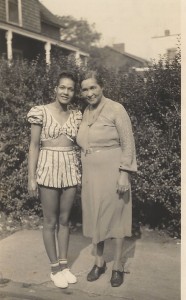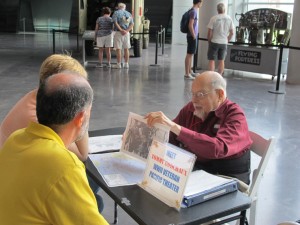
Conducting oral history interviews takes patience and planning. Your family and community members hold precious stories and memories that are legacies of tradition, culture and history. But, what should you do if relatives are reluctant to be interviewed? As a genealogist, I do what I call the ‘un-interview.’
The first time I went to Mississippi and Louisiana to learn about my father’s Southern roots, I was warned: “Don’t come down here asking questions and digging in local court records alone. Southerners are very suspicious of Northerners,” said my Louisiana cousin Antoinette. “The Mississippi blacks and whites are even more clannish and they stick together,” she said. Besides being a musical and show business family, my paternal elders said that we were Creoles. I wanted first-hand knowledge. Once my elders left the South for Harlem, as part of the nation’s largest Black Migration, they never returned. But many of my relatives stayed. So, I needed to go there. One Southern elder cousin agreed to be interviewed. But she changed her mind when I arrived. “Not on camera. Maybe I will do audio,” said cousin Snow Owl as she eyed my equipment. I slowed down. We needed to spend time together simply visiting, cooking, shopping, talking, eating and going to church to meet-up with her friends, neighbors and extended family.
Check out these guidelines from the Smithsonian Center for Folklife and Cultural Heritage: “When interviewing members of your family or local community, be sure to seek out not only what they can tell you about the past, but what they can tell you about life in the present. How have certain family traditions evolved? What holiday customs are practiced today that weren’t a generation ago? What special foodways and rituals are part of community celebrations and why? What skills and abilities are needed to practice a particular craft or trade? How are these skills learned, mastered, and passed on to younger generations?”
Here are my top 5 Oral History tips
1.Build trust. Do your genealogy homework to check names, dates and facts. Learn multicultural dialogue rules and community rituals. Seek permission before all interviews. In my mixed-race family you must share a cup of tea, visit for three days, or bring gifts before you can ask anything. Asking questions is considered rude in some cultures. Timing is everything. Slow down. Wait for the right moment to bring up sensitive topics like slavery. Group gatherings hosted by a trusted local family member or friend provides a great way to start. Tap your network to make connections to help you find ways to build trust.
2. Show and tell your project. I was producing a family documentary and a ‘cooking genes’ cookbook. I brought along video clips, old photos, Baptism certificates, census reports, DNA results, and recipes. These items opened doors. Once they realized that I was not seeking hard facts or figures but simply stories, they relaxed. Reluctance relatives and family friends now loved being the center of attention and telling their stories. They were able to clarify and correct official records and add recipes.
3. Equipment. Less is best. Bring a mobile device, camera, and a portable scanner. Explain your interview process so the subjects know what to expect.

4. The Un-Interview. Don’t ask Yes or No questions. Don’t interview or use the word ‘interview.’ As a long-term genealogist, I learned that people hate interviews! My people equate the word ‘interview’ with ‘interrogation.’ Engage. Do ask for stories. Here are sample questions that generated conversations and details: Describe memorable weddings or funerals. Describe our family’s religious and spiritual practices. What languages or Creole words do you remember? How has this neighborhood changed over the years? What are the secret ingredients in this delicious Gumbo or Creole dinner? What are you growing in your garden? Describe routes and regional ways of transportation. Who are your favorite musicians? What dance steps do you remember? Who/What are your favorite writers, books, songs, artists, and films? Don’t judge the answers. Put the subjects at ease and tell them that all their words are precious. Ask a question and listen. Do not interrupt or correct.
5. Wrap-up: Share interview results with photos, video, and transcriptions.
What are your top oral history tips?

I have been tracing my family history and I ran into so many dead ends I became disheartened and stopped for a few weeks. I really regret not starting sooner because most of the people who could have helped me have passed on. (sigh) On the bright side, there are a couple of relatives I could spend some time un-interviewing. Thanks for the tips.
Glad you liked my ‘un-interviewing’ tips for Oral History interviews. I’m certain your journey will lead to bright moments and fun family stories for you!